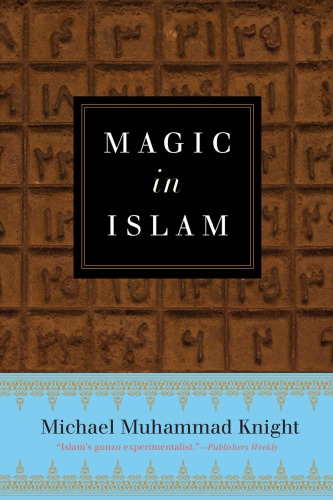
Magic In Islam
کتاب های مرتبط
- اطلاعات
- نقد و بررسی
- دیدگاه کاربران
نقد و بررسی

March 14, 2016
Knight (Why I Am a Salafi) presents this work as a challenge to all kinds of preconceived notions: Islam as a stable and monolithic community, as depicted in the popular introductory genres; Islam as a faith determined only by the text of the Qur’an; Islam as a religious tradition fitting neatly into modern Western perceptions of the world. Instead, as Knight explores fascinating topics such as Muslim approaches to astrology, the existence of jinn, and the use of the Qur’an in healing charms (where it’s treated as a text containing magic independent of its meaning), he exposes the complexities of histories and cultures that underlie contemporary Islam and reveals how the legacy of strict categorization and simplification has left common understandings of Islam incomplete. His writing is lucid and perceptive, and his instincts for the arcane and interesting are unerring, making the text scholarly yet still accessible to the lay reader regardless of familiarity with Islam. Knight refers to this work as “his sandbox to play in,” and his pleasure in the topic shines through on every page, spreading his delight to the reader.

April 1, 2016
The mysteries and the esoterica of Islamic history and culture. Knight (Why I Am a Salafi, 2015, etc.) begins with a scholarly explanation of why "magic" cannot be fully defined outside the confines of a European past; he concludes that, at best, it is a construct of any given culture and time and thus a fluid concept by nature. "Having performed the necessary deconstruction of categories and displayed critical self-awareness, now I'm going to do whatever I want," he writes at the end of the introduction. "Maybe this book should just be called Weird Shit in Islam." Despite that moment of levity, Knight presents an erudite and wide-ranging exploration of what might be popularly called "magic" in Islam. His subject matter spreads across centuries and continents. Knight begins, however, with the text of the Quran, in which he locates and discusses the Arabic term for sorcery. The term takes on a variety of meanings, ranging from satanic implications to mere superstitions. The Quran, as a book steeped in the power of the supernatural, has often been seen to have powers and properties that might be viewed as magical--e.g., the power to heal. Understanding Islam as a religion that cannot be studied apart from the cultures with which it has been in contact, Knight moves on to discuss astrology in Islam, a facet that often stemmed from contact with other religions. Similarly, the Quran mentions a figure named Idris, whom many trace back to the Hebrew Enoch and even to the Greek god Hermes. The author rounds out his book with a discussion of prophecy as projected through dreams and a look at Islamic power motifs in more modern black culture. Knight delivers a thought-provoking introduction to a little-examined subject, albeit a hard one to define. Though surely controversial and certainly just the tip of the iceberg, this accessible book provides interesting food for thought.
COPYRIGHT(2016) Kirkus Reviews, ALL RIGHTS RESERVED.

June 1, 2016
In exploring the role of magic in Islam, Knight (religious studies, Univ. of North Carolina at Chapel Hill; Why I Am a Salafi) maintains that the difference between the supernatural and religion is often blurred, and that the concept of alchemy tends to be misconstrued when viewed from a Eurocentric perspective. As a result, Knight begins this work by explaining what magic is not, rather than what it is. He continues by referencing otherwordly elements found in the Koran (e.g., sorcery, jinn), reminding readers that interpretation of the spiritual text varies depending on individual beliefs, from a literal interpretation to an allegorical one. The author discusses astrology in relation to the Islamic lands during medieval times, blending the ideas of magic and medieval scientific thought. He concludes with prophecy, which some interpret as beyond the human realm, while others see it as an aspect of religion. VERDICT Weaving among the grey areas of magic, religion, and science, this meandering narrative might distract a few readers, but the subject matter is both novel and intriguing.--Muhammed Hassanali, Shaker Heights, OH
Copyright 2016 Library Journal, LLC Used with permission.

























دیدگاه کاربران